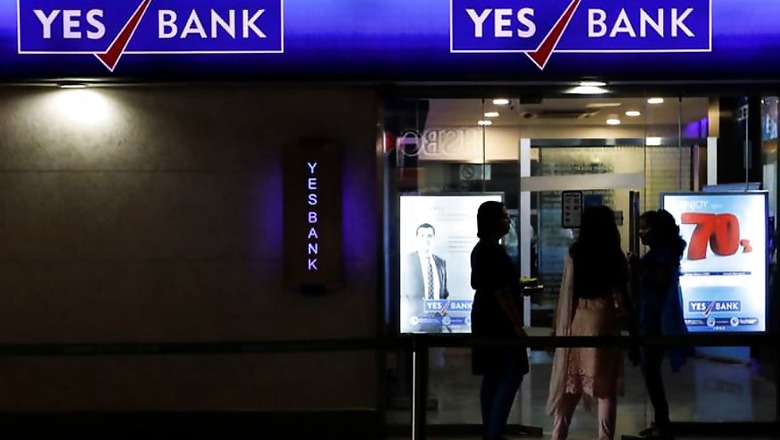
views
Yes Bank CEO-designate Prashant Kumar on Tuesday ruled out a forensic audit of the lender's books and remained non-committal on continuing to pay the present 5-6 per cent interest on deposits.
Kumar also said there is absolutely no worry on the liquidity front and a complete operational normalcy will be restored from 6 pm on Wednesday.
The retired SBI banker, who will formally take over as the chief executive and managing director on March 26 as per the rescue plan authored by the RBI, further said he expects Rs 8,500-10,000 crore recoveries in the March quarter as the bank has already made higher provisions of over 72 per cent from 42 per cent and that he does not expect more than the already announced 5 per cent more slippages.
"There is absolutely no need for a forensic audit on the books of Yes Bank as what we have declared in the Q3 results as doubtful assets are on most conservative basis.If at all we finally book an additional Rs 8,500 crore in fresh slippages, our higher provisions at 72 per cent will make sure that the credit cost comes down in absolute terms," Kumar, who was flanked by Rajnish Kumar, the chairman of SBI, which is the largest shareholder of Yes Bank with close to 43 per cent ownership, and Ashutosh Khajuria of Federal Bank which has invested Rs 300 crore into the bank's rescue, told reporters here this evening.
However, both the Kumars were non-committal on continuing to pay the higher 6 per cent interest to savings bank depositors nor changing the present auditor BSR & Company, a KPMG affiliate under whose watch the bank went belly up.
It can be noted that Yes Bank, Kotak Mahindra Bank and DBS are the only three lenders that offer 6.5 per cent interest on savings bank deposits, while the nation's largest lender SBI pays a paltry 3 per cent and the heavily retail-focused HDFC Bank pays 3.5 per cent.
On the issue of the bank being sued by the AT1 bondholders (Rs 10,000 crore worth of additional tier 1 debt), who claim that Yes Bank miss-sold the debt instrument to them which now have been completely written down by the RBI under the rescue plan, both the Kumars said the matter is sub-judice and if its proven that there was in fact mis-selling then it could be looked into.
"As the matter is pending at the Bombay High Court, let's not discuss it much. All we can tell you is that as far the bank is concerned, we have not broken any written convents with the asset managers and bondholders," they said.
They also did not offer a clear answer on the lock-in on even retail investors of the bank stocks, who are also planning to sue the bank and the RBI.
It can be noted that on March 5, the Reserve Bank had imposed a moratorium on Yes Bank for 30 days, including capping withdrawals at Rs 50,000 per depositor after it found that the new management was unable to raise the urgent core capital which had fallen much below the mandated level.
Since last November, Yes Bank had been saying it would raise at least USD 2 billion in core equity capital.
But the bank and the RBI said the moratorium will be lifted at 6 pm on March 18, as per the reconstruction scheme notified and that it will be back to normal operations.
"We have made adequate precautions. All our ATMs are filled with cash. All our branches have adequate supply of cash. So, from our side, there is absolutely no issue on the liquidity front," Kumar said, adding in fact since the past three days more money is coming to the bank than being taken out.
Also, only one-third of the depositors did withdraw the mandated Rs 50,000 that too in the initial days.
He also clarified that there would not be any need to depend on external sources for liquidity, to which the SBI chairman chipped in saying they have more than enough credit line to draw from but don't think they need to draw down on them given the present liquidity position.
"And if there is a need, then those liquidity lines can be pressed into operations," Prashant Kumar said and assured depositors that there is absolutely no need to worry about the safety of their money.
After the moratorium is lifted, Kumar said all the customers would be able to enjoy the entire banking services as before or even better as "the entire staff is fully geared up to serve the customers better with more commitment".
Going forward, the CEO-designate said he has tasked the sales force to get 60 per cent deposits and loans from the retail side but did not offer a time-line to achieve the same.
About the reconstruction scheme, Kumar said due to government support, the RBI and the other financial institutions, the crisis at the bank was resolved in just 13 days as against the initially planned 30 days, which he described as something unprecedented.
Under the scheme, Yes Bank has received over Rs 10,000 crore from eight financial institutions, including Rs 6,050 crore from SBI and the rest from seven other private sector banks including ICICI Bank, HDFC and Kotak Bank.
The SBI chairman said not even a single Yes Bank share it holds would be sold before the three-year lock-in period.
He also said SBI would increase stake in Yes Bank to 49 per cent from current over 42 per cent in the second round of funding which should happen by the end of the present quarter.
Shares of Yes Bank jumped over 59 per cent to close at Rs 58.65 on the BSE, whose benchmark tanked another 2.6 per cent on Tuesday capping the losses since the coronavirus scare at over 32 per cent now.
ICICI Bank and HDFC have invested Rs 1,000 crore each into the bank, while Axis Bank put in Rs 600 crore, Kotak Mahindra Bank (Rs 500 crore), Bandhan Bank, Federal Bank (Rs 300 crore each) and IDFC First (Rs 250 crore) also joined the SBI-led consortium to invest in Yes Bank.
On Monday, RBI Governor Shaktikanta Das said the crisis ridden bank has enough funds to meet any requirements and assured that the central bank will provide additional liquidity support if needed.
There is a worry that once the moratorium is lifted on March 18 evening, there can be a run on the bank, putting more liquidity pressure.
"I would like to mention that Yes Bank has enough liquidity to meet any requirement. If there is a requirement, the RBI will provide necessary liquidity support" Das told had told reporters.
The bank's deposit base eroded by Rs 72,000 crore to Rs 1.37 lakh crore as of March 5, 2020 as against Rs 2.09 lakh crore as of December 31, 2019 according to the data shared by the bank last Friday while announcing the Q3 earnings.
















Comments
0 comment